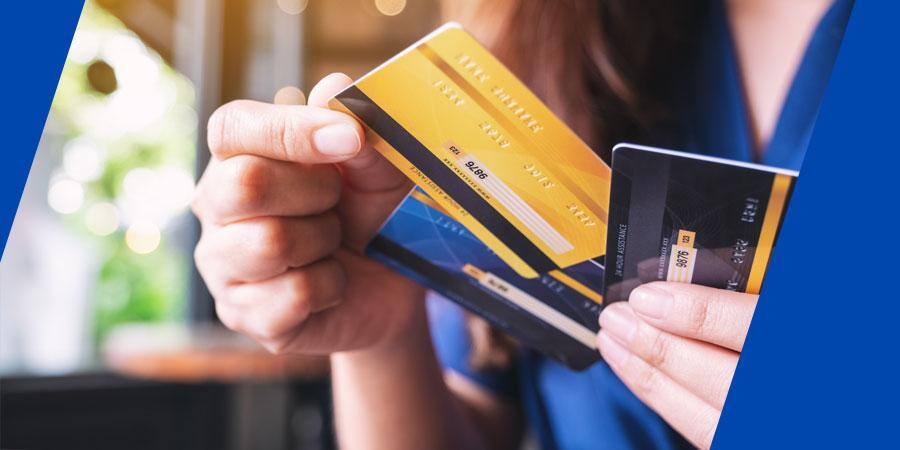Credit cards offer a convenient and effective way to manage your finances and build credit. However, it’s important to use them wisely, otherwise they could cost you money and hurt your credit score. With that in mind, let’s cover five credit card mistakes to avoid, so you stay on solid financial footing.
1. Choosing the Wrong Credit Card
Getting a credit card is a financial commitment. Building and maintaining strong credit enables you to get approved for loans with better rates, apply for housing, and the list goes on. It’s important to choose a credit card that you can afford and manage well because bad credit can wreak havoc.
While a card may offer attractive rates or rewards, does it really fit your needs? Is it the best card to build or repair your credit? Are the rewards you can get worth higher rates or fees?
These are some of the questions you should ask yourself when choosing a card. It’s not a decision to make lightly. Make sure to do your research.
Need help choosing a credit card? We’ve got a quick read that can help you make the best choice for your lifestyle.
2. Not Knowing the Terms of Your Credit Card
Nobody enjoys reading the fine print. When it comes to credit cards, though, it’s important to understand the terms associated with them. Otherwise, you could run into unexpected fees and charges.
Make sure you understand terms such as introductory rates, balance transfer fees, and anything else that could potentially lead to you having to pay more.
For example, just because you have a zero percent APR doesn’t mean you’ll never pay interest. That rate could be an introductory rate and only last a certain period after you open that account. So, it’s important to know when that introductory rate ends so that you can pay off your card balance in full – and avoid being charged your card’s regular purchase APR rate.
The bottom line: Be aware of and stay current on the rates and terms of any of your credit cards.
3. Not Making Payments on Time
A credit card payment that’s 30 or more days late can have a significant impact on your credit. Your payment history is the greatest influencing factor on your FICO score, meaning that paying your credit card bill on time is crucial.
While it’s possible to reduce their impact over time (by paying on time), late payments typically remain on your credit history for seven years. This can seriously hamper your ability to build your credit or keep your credit score in good standing.
To ensure you pay your credit card bills on time, set up autopay through your credit union or lender. Some lenders, upon request, will send you reminders as well. Take advantage of those services.
4. Making Minimum Payments
It can be tempting to make minimum payments. They seemingly make debt more manageable, however, interest charges can add up quickly. And remember, as your credit card balance increases, so does your credit utilization rate.
Credit utilization rate refers to the percentage of your available credit usage at a given time. If your card balance increases above 30% of your credit limit, the impact on your credit score can be drastic.
Make it a priority to pay down any credit card debt. If possible, use other payment methods to help you achieve that goal. At the very least, make minimum payments sparingly.
5. Using Your Credit Card Beyond Your Means
Let’s be honest, it’s easy to lose track of credit card spending. Who doesn’t enjoy treating themselves to a new pair of shoes or set of golf clubs when you don’t feel the immediate impact on your bank account? You are going to repay that credit card charge later, right?
It’s also easy to overspend when you are chasing rewards points/dollars. But is it worth it? Let’s say you have a credit card that offers 1% cash back. You typically spend $1,000 a month on that card, which would earn you $10 in rewards.
However, you start convincing yourself it’s OK to spend more using that card because of the cashback reward. Your monthly card balance increases to $1,500. Is it worth spending $500 more on that card to earn an extra $5? Probably not.
Final Thoughts
Avoiding credit card mistakes is key to maintaining a healthy credit score. Make it your goal to use your cards responsibly and pay off debt in full each month. Resist the temptation to overspend or fall behind on payments. Take advantage of online management tools and budgeting apps to help you to stay on track. It’ll make it that much easier to keep your credit in good shape.
Apply for a TwinStar Visa® Credit Card Today
To learn more about our Visa credit card options or apply for a credit card, visit TwinStarCU.com/Visa.
*APR = Annual Percentage Rate. All rates based on approved credit. The fixed introductory rate applies to new purchases posted to a new Visa account for 180 days from the account open date. Your rate for purchases and unpaid balances after the 180-day introductory period will be adjusted to non-introductory rates. Rates are subject to change quarterly. The index is The Wall Street Journal Western Edition Prime Rate as of: February 28; May 31; August 31; November 30 of each calendar year, plus the margin. Rates are subject to change: March 10; June 10; September 10; and December 10 of each calendar year. Annual fees: $25 for Platinum Rewards Visa; none for Platinum or Classic Visa.
Method of Balance Computation: Average Daily Balance (including current purchases).
Grace Period: 21 days.
Minimum Payment: 3% of the balance or minimum $25 whichever is greater.
Late Payment Fee: Payments more than 4 days past due will be charged $20.00.
For full printable disclosure click here. A printable card agreement is available here
